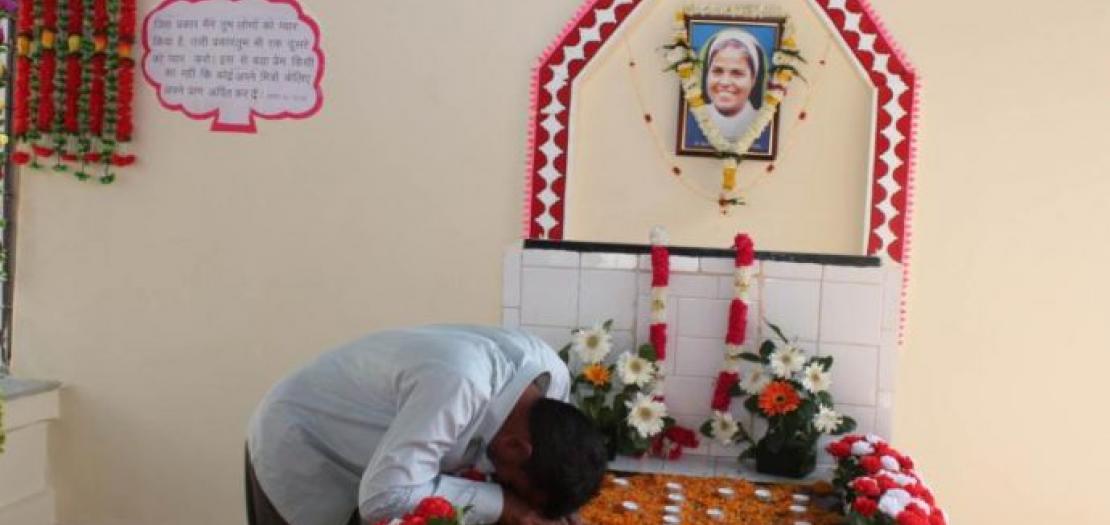Issued by the Catholic Center for Studies and Media - Jordan. Editor-in-chief Fr. Rif'at Bader - موقع أبونا abouna.org

The Nov. 4 beatification of Sister Rani Maria Vattalil honors a woman who gave her life helping the poor and marginalized in India. Vattalil worked with the landless poor, urging them to insist they receive a living wage from their landlords, organized village women into self-help groups, and helped families establish savings accounts. This affected the profits of moneylenders, who hired an assassin to murder her.
*****
An Indian nun murdered, on the order of moneylenders affected by her social work among the poor, on a bus is the latest person to be beatified in India.
Sister Rani Maria Vattalil, a member of the Franciscan Clarist Congregation, was stabbed 54 times in front of more than 50 passengers on January 25, 1995.
The crime took place near the village of Udainagar, in the central state of Madhya Pradesh.
The state is over 90 percent Hindu and less than 1 per cent Christian, and the Christian community often suffers various forms of discrimination.
Vattalil worked with the landless poor, urging them to insist they receive a living wage from their landlords, and encouraging them to give up bad habits, like drinking.
In addition, the Kerala-born nun taught farmers more modern agricultural methods, and helped parents send their children to school.
She organized village women into self-help groups - that could even pool resources to provide financial assistance in emergencies - and helped families establish savings accounts.
Her work among the poor meant they were less likely to make use of local moneylenders - who often were also the landlords of the villagers - and they arranged to have her killed.
As the 41-year-old nun was dying, she kept repeating the name of Jesus. “Jesus” was the last word from her lips.
“Sister Rani Maria, the daughter of the Church of India is a model for heroic life,” Cardinal Baselios Cleemis told Crux.
Cleemis, the president of India’s bishops’ conference, said the nun is a symbol of the deep Christian commitment to the service of the poor and marginalized.
“Sister Rani Maria is a model for proclaiming the Gospel in a pluralistic country,” the cardinal said.
Vattalil’s murderer, Samundar Singh, was sentenced to life imprisonment.
The nun’s younger sister - also a religious, Sister Selmi Paul - visited Singh in prison in 2002, and tied a Rakhi to his hand.
The Rahki is part of the celebration of the Hindu festival of Raksha Bandhan.
Raksha Bandhan means “the bond of protection” in Hindi and traditionally celebrates the relationship between brothers and sisters. In modern times, the festival has taken on an added significance, and celebrates any relationship between men and women which has the characteristics of a brother-sister bond.
The rakhi symbolizes the obligation of the man to honor and protect the woman. The universal meaning of the festival means it has been adapted by other religious groups in India, including Christians.
Singh, overcome by this sign of forgiveness, expressed his repentance for the murder.
“I was overcome with grief and remorse for killing an innocent nun, who only selflessly worked to uplift the poor people and make our nation progress,” he told Asianews in 2010.
Even though he was hired to perform the murder, he still assumed full responsibility for his actions.
“I accept full responsibility for my heinous murder of Sister Rani Maria. I cannot say that I was instigated, because my own hands stabbed her repeatedly and for this, I will regret my actions till the day I die,” he said.
“In my own small way, I try to follow her example, helping those who are less fortunate than me, like Tribal Christians and all those who are marginalized,” Singh said at the time.
In 2006, at the request of Vattalil’s family and Catholic leaders, Singh was released from prison.
Singh, a Hindu, has continued to be an advocate of interreligious harmony in India, and has often praised the work of the Christian community in the country.
A 56-minute documentary film, Heart of a Murderer, about Vattalil’s murder and Singh’s repentance, was released in 2013, and won the top prize at the World Interfaith Harmony Film Festival.
Indore, the place of the beatification, is the largest city of Madhya Pradesh.
The state is ruled by the Hindu-nationalist Bharatiya Janata Party (BJP), which also controls the national government. The BJP has strong links to the Rashtriya Swayamsevak Sangh (RSS), a militant Hindu nationalist organization.
Anti-Christian sentiment is still strong in Madhya Pradesh, and several Christians have been arrested under the state’s anti-conversion laws.
Church leaders issued invitations to local civic leaders to attend the ceremony.
“We are sure that Sister Rani Maria who worked, served and died for the people, through her powerful intercession, our services may be more effective for the good of all the people,” said Indore Bishop Chacko Thottumarickal.
“Blessed Rani Maria is a model for us, as she was ready to shed her blood for the sake of the poor and downtrodden,” the bishop said.
Thottumarickal told Crux the relic presented at the ceremony is one of the nun’s rib bones, which bears the knife marks of her martyrdom.
Cleemis told Crux Vattalil’s martyrdom and beatification is the culmination of her Christian Life.
“She lived, worked and surrendered her life and was martyred for her mission,” the cardinal said.
Assassin of the nun says he is happy she is now being beatified
Samandar Singh, then 22, murdered her on behalf of money lenders upset with Sister Rani Maria’s work setting up self-help groups in the Diocese of Indore. Singh has since been forgiven by the nun’s family and was released from prison.
“Whatever happened has happened. I am sad and sorry about what I did. But now I am happy that the world is recognising and honouring Sister Rani,” Singh, a Hindu, told Catholic News Service in a telephone interview from his village of Semlia.
Singh was convicted of the murder and initially was sentenced to death; the sentence was later commuted to life in prison. He said that Sister Rani Maria’s younger sister – Clarist Sister Selmy – had formally accepted him as her “brother” while he was in prison and facilitated his early release. Court officials agreed to the release in 2006 after mandatory declarations were signed by Sister Selmy, her parents and Church officials.
When Sister Selmy was preparing to return home to southern Kerala state in January 2007 to visit her ailing 82-year-old father, Paul Vattalil, Singh accompanied the nun and apologised to her parents.
“I am now eagerly waiting for the big day,” Singh told CNS.
Bishop Chacko Thottumarickal of Indore told CNS the beatification of Sister Rani Maria “will be an inspiration for those serving the needy and poor in difficult circumstances in the country.
“Sister Rani Maria challenges all to carry on their work even if there is opposition and not to get disheartened by obstacles,” added Bishop Thottumarickal.
Sister Selmy called the beatification “a miracle.”
“Sister Rani urges us all to go forward fearlessly,” said Sister Selmy, who serves in a remote village in Uttar Pradesh state.
Cardinal Angelo Amato, prefect of the Congregation for Saints’ Causes, will preside over the beatification. Archbishop Giambattista Diquattro, apostolic nuncio to India, will lead the thanksgiving Mass on November 5 at Udainagar, 25 miles from Indore.







